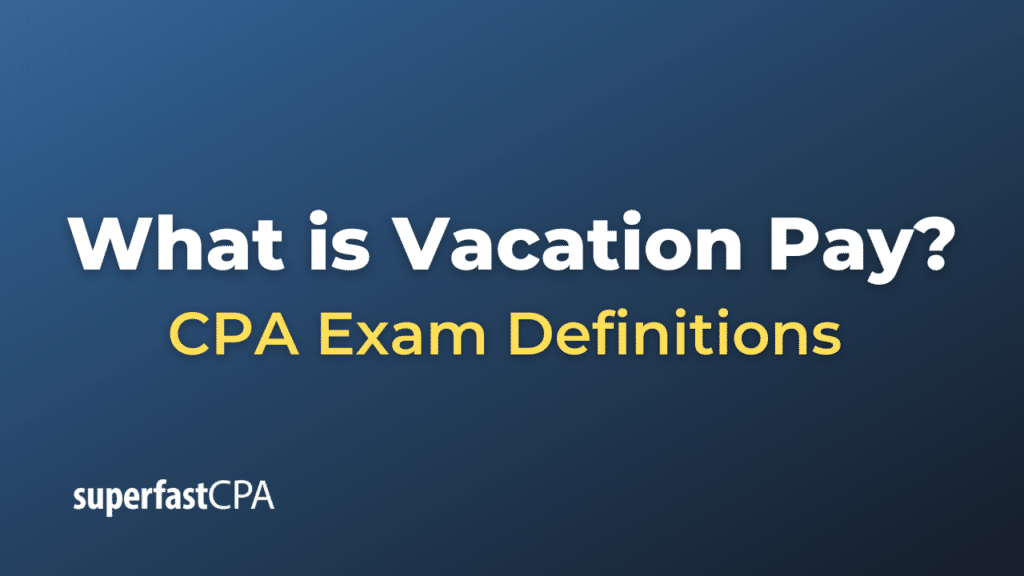Vacation Pay
Vacation pay is a form of employee compensation where workers are paid while they take time off from work for a vacation or holiday. This is in contrast to unpaid leave, where an employee would take time off work but not receive their regular pay for that period. Vacation pay is a benefit provided by employers to promote work-life balance and employee well-being, and it often accrues over time based on the length of employment and other factors set forth in an employment agreement or as mandated by law.
The specifics of vacation pay can vary widely depending on the jurisdiction, the employer, and the terms of employment. Here are some general methods by which vacation pay may be administered:
- Accrual System: Employees earn a certain amount of vacation time for each hour, day, or week worked. For instance, an employee might earn one day of paid vacation for every month of service.
- Lump-Sum: In some cases, employees are given a set number of vacation days per year, regardless of hours worked.
- Unlimited Vacation: Some companies offer “unlimited” vacation days, generally expecting that employees will use this time responsibly and not hinder business operations.
- Paid Time Off (PTO): This is a more flexible arrangement where employees have a bank of time off that they can use for various reasons, including vacation, personal days, or illness.
- Holiday Pay: In some countries, additional pay is provided for working on public holidays, and this might be considered a form of vacation pay.
- Statutory Requirements: Many countries mandate that employers provide a certain amount of paid leave, although this can vary significantly from one jurisdiction to another.
- Carry Over and Caps: In some systems, unused vacation time can be carried over into the next year, although there may be a cap on how many days can be accumulated.
- Cash Out: Some employers allow employees to “cash out” unused vacation days, receiving a monetary payment instead of taking the time off.
- Combined Benefits: Employers may offer a combination of these benefits depending on seniority, employment status (full-time, part-time, contract), and other factors.
It’s important for employees to understand their company’s vacation pay policy, which should be outlined in an employment contract or employee handbook. Consultation with a human resources representative can also clarify any questions regarding vacation pay.
Example of Vacation Pay
Let’s consider an example to illustrate how vacation pay might work in a typical employment setting.
Example: Accrual System for Vacation Pay
Company Policy: The company offers paid vacation time based on an accrual system. Employees earn 1 day of vacation for every month worked.
Employee: Sarah has been working full-time at the company for 12 months.
Calculation of Vacation Days
- Sarah earns 1 day of vacation for every month she works.
- After 12 months, Sarah would have accrued 12 vacation days.
Usage of Vacation Days
Sarah decides to take a one-week vacation, which equates to 5 working days. She would submit a vacation request to her manager and upon approval, she can go on vacation for those 5 days while still receiving her regular pay.
Remaining Vacation Days
After taking her one-week vacation, Sarah would still have 7 vacation days left (12 original days – 5 used days = 7 remaining days) for the rest of the year. Depending on company policy, she might be able to carry these over into the next year or might be required to use them by the end of the current year.
Additional Points to Consider
- If Sarah works on a public holiday, the company’s policy might offer her extra pay for that day or an additional day off, depending on jurisdiction and internal policy.
- Some companies have a “use-it-or-lose-it” policy, where accrued vacation time expires at the end of the year if not used.
- Some companies allow employees to “cash out” unused vacation days, so Sarah might have the option to receive extra pay in lieu of taking days off.
This is a simplified example and real-world situations may involve more complex factors like probationary periods, varying accrual rates based on seniority, and so forth. Always refer to the specific employment contract or consult with the Human Resources department for precise details related to vacation pay.













